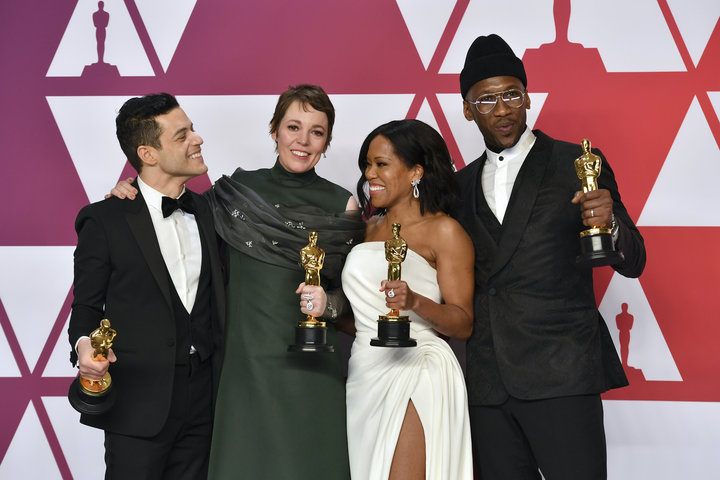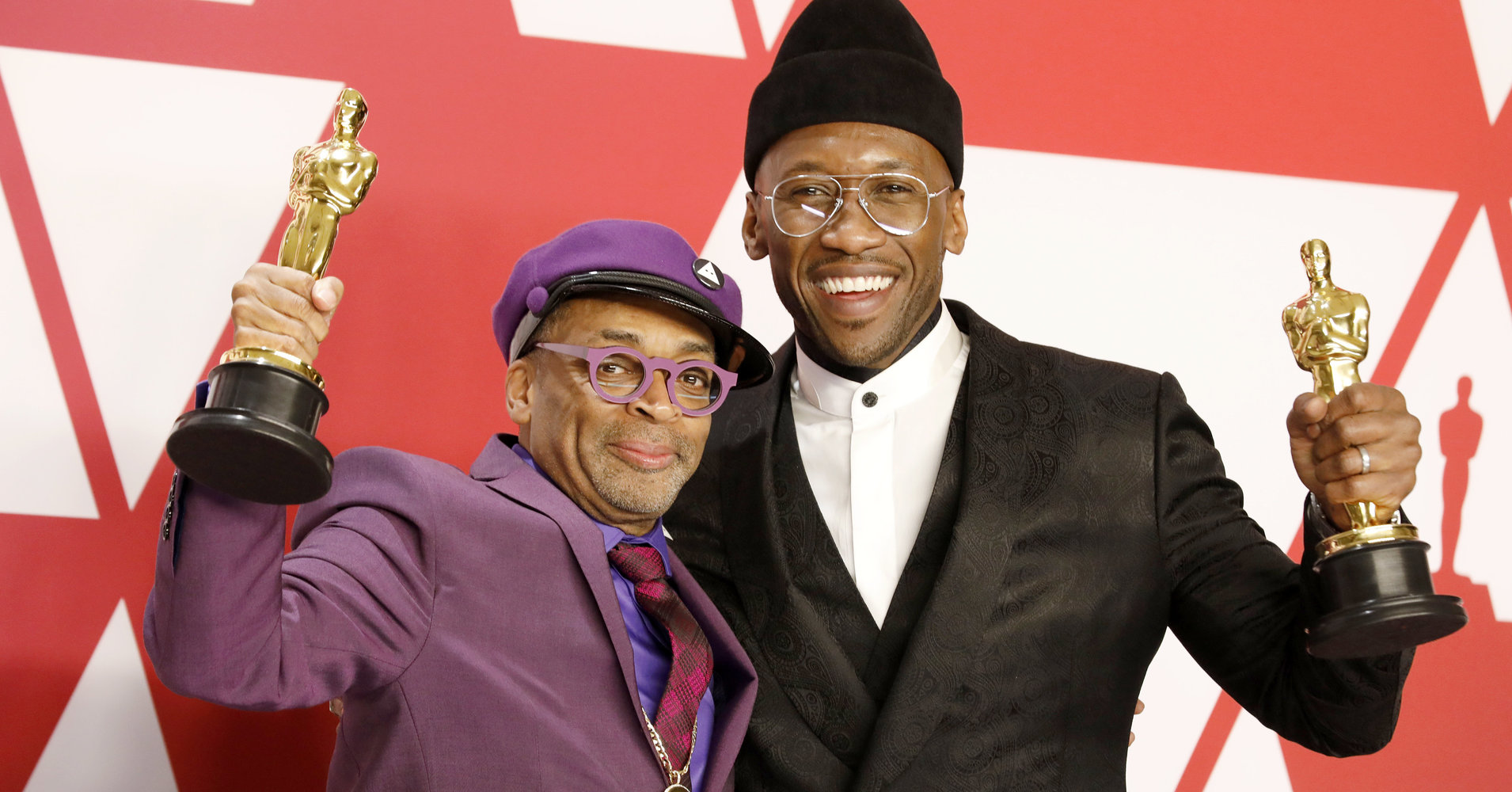[ad_1]
To many viewers of Sunday night’s Academy Awards, the Best Picture win for the tone-deaf, anachronistic racial reconciliation dramedy “Green Book” landed with a thud, seemingly flying in the face of so many other wins for diversity and representation throughout the evening.
The big night for “Green Book” immediately earned comparisons to the shock Oscar win for 2005’s “Crash,” a similarly saccharine depiction of race in America — and a Best Picture pick that has not aged well. Sunday night was also an alarming sequel to the 1989 Best Picture race, when “Driving Miss Daisy” (a reverse “Green Book,” as HuffPost’s Matt Jacobs wrote Sunday) emerged victorious over director Spike Lee’s seminal “Do the Right Thing.”
Fast-forward 30 years, and in some ways, it seems as if nothing has changed — which fittingly is the thesis of Lee’s “BlacKkKlansman,” nominated for Best Picture alongside “Green Book,” while telling pretty much the opposite — and much more realistic — story about race in America.
“Every time someone is driving somebody, I lose,” Lee, who did finally win his first competitive Oscar of his storied career, for best adapted screenplay, quipped to reporters after the show.
His victory was one of many landmark wins for diversity and representation during Sunday night’s festivities. So in spite of the show’s less-than-ideal ending, let’s not forget how this year’s Oscars were by far the most diverse in recent memory, with more than half of the 24 award categories won by at least one person of color, and significant strides for movies directed by women.
In past years, the show’s producers have attempted to offset #OscarsSoWhite and the dearth of winners and nominees of color by stacking the show with diverse presenters. This year’s memorable presenter pairings furthered that momentum — a majority of the categories were presented or co-presented by a person of color.
But even more importantly, many of this year’s winners finally began to reflect those diverse presenters, suggesting at least some forward movement in the academy’s and Hollywood’s efforts to promote more inclusion and representation.
“Black Panther” costume designer Ruth Carter and production designer Hannah Beachler each became the first black women to win in their respective categories, and won for a Marvel superhero movie that centers on the black experience and was led by a majority-black cast. Both women thanked director Ryan Coogler, who has made inclusive hiring a priority on his projects, hopefully setting an example for other filmmakers.
“We’ve opened up the door,” Carter told reporters after her win. “Finally, the door is wide open.”
Carter’s and Beachler’s Oscars were among the seven individual wins for black artists Sunday night, including best supporting actor and actress winners Mahershala Ali and Regina King, setting a record, according to the Los Angeles Times.
While a number of critically acclaimed movies directed by women were ignored in the Best Picture and Directing categories this year, female-led movies scored big wins in other categories.
Movies directed or co-directed by women of color won in three categories, including best documentary short subject winner “Period. End of Sentence,” directed by Rayka Zehtabchi, who became the first Iranian-American woman to win an Oscar, according to Vice’s Broadly. Best documentary feature winner “Free Solo” was co-directed by Elizabeth Chai Vasarhelyi, the daughter of immigrants from Hong Kong and Hungary, and her husband Jimmy Chin, the son of Chinese immigrants.
Best animated short went to Pixar’s “Bao,” about a Chinese immigrant mother struggling with empty nest syndrome and trying to reconnect with her son — directed by Chinese-Canadian Domee Shi, the first woman ever to helm a Pixar short.
Animation notched another landmark victory, when the groundbreaking “Spider-Man: Into the Spider-Verse,” featuring a half-black, half-Latino protagonist in a reinvention of the classic superhero saga, won best animated feature. The movie’s co-director Peter Ramsey became the first black man to win in that category.
During the team’s acceptance speech, co-producer Phil Lord noted the significance of representation on screen.
“When we hear that somebody’s kid was watching the movie and turned to them and said, ‘He looks like me,’ or ‘They speak Spanish like us,’ we feel like we already won,” he said.
Best foreign language film winner “Roma,” monumental for its grand yet intimate portrayal of a year in the life of an indigenous Mexican domestic worker, garnered several wins Sunday night for Mexican director Alfonso Cuarón.

Cuarón’s Directing Oscar, his second after first winning for 2013’s “Gravity,” was the seventh time in the last 10 years that the top directing prize went to someone who wasn’t a white man.
Just under a decade ago, Kathryn Bigelow became the first (and still only) woman to win, for 2009’s “The Hurt Locker.” Taiwanese director Ang Lee, the first person of color to win in Directing for 2005’s “Brokeback Mountain,” won a second time for 2012’s “Life of Pi.” And Cuarón and countrymen Alejandro González Iñárritu and Guillermo del Toro have won a combined five times in the last six years.
With his win for “Bohemian Rhapsody,” Rami Malek, the son of immigrants from Egypt, became the first Arab-American Best Actor winner. During his acceptance speech, Malek acknowledged the significance of his win, also noting that the Freddie Mercury biopic is important for its depiction of an LGBTQ icon (though the film has faced criticism for a lack of nuance about the Queen frontman’s ethnic and sexual identity, among other factual inaccuracies and controversies).

Sunday night’s Oscars felt like a major improvement from even just a year ago, when the academy talked the talk but didn’t necessarily walk the walk, airing a prematurely celebratory montage patting itself on the back with cherry-picked examples, all from within the last two years.
“We are still trying to get more reflective, still trying to get there,” Regina King told reporters Sunday, after her Actress In A Supporting Role win for “If Beale Street Could Talk,” Barry Jenkins’ adaptation of James Baldwin’s novel. “So many women have paved the way. I walk in their light, and I also am creating my own light.”
[ad_2]
Source link

